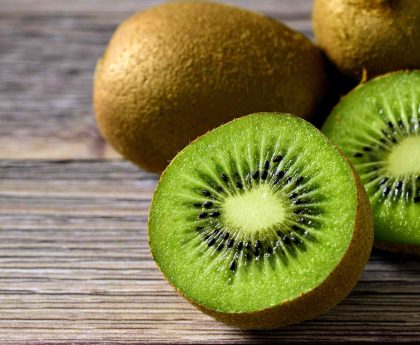March is National Nutrition Month, and the theme for 2023 is “Fuel for the Future.” It underscores the importance of choosing nutritious foods that are also good for the environment.
One example of choosing foods that benefit our plant would be eating legumes (beans, lentils, peas) instead of meat as a source of protein.
“Generally, plant-based foods use less land and water than the production involved with animal-based products,” explains Cathy Deimeke, registered dietitian at UC Davis Health. She is the manager in Health Management and Education, which hosts a variety of wellness classes for UC Davis Health patients.
Our UC Davis Health registered dietitians have a few other eating, shopping, and food preparation tips that are both good for you and the planet.
Eat with the environment in mind
It’s clear that the food on our plate has a big impact on our health, but it also has a major impact on the health of our planet. Fortunately, a plant-based diet focused on vegetables, fruits, grains, nuts, and beans instead of animal-based products can have positive impacts on both.
“Even a few simple swaps can have major benefits,” says UC Davis Health registered dietitian Haley Dockrey. “Two examples include swapping out dairy milk for calcium-fortified soy or oat milk in your morning cereal or replacing ground meat in your tacos with black beans.”
Plant-based eating can be quite simple. Lots of restaurants now offer several plant-based alternatives.
Learn more about plant-based diet: A detailed beginner’s guide
Ideas for sustainable grocery shopping
Between growing food, packing, transporting, and waste, food production can take a toll on our environment. Plastics, for example, are polluting our streets, national parks, and oceans. There are several ways that shopping for plant-based foods can be low-waste and come with minimal packaging.
“My favorite tip is to purchase grains and dry beans from bulk bins at grocery stores,” Dockrey says. “Doing this allows you to buy the exact amount you need while eliminating extra packaging. Bonus points if you bring your own reusable bags or glass jars.”
Other ways to reduce plastic packaging include buying seasonal fruits and vegetables from your local farmers market. You can also try growing your own food, such as fresh herbs, at home.
View a list of times and locations for farmers markets in Sacramento County
Learn more about how to grow food at home (even in a tiny apartment)
Stay nourished and save money
Planning your meals and snacks not only benefits your own health, but often reduces waste and saves you money.
“When I cook a meal, I try to find creative ways to include leftovers into the next day’s lunch,” Deimeke says.
An extra portion of chicken or fish could add protein to a salad or grain bowl.
“If I make a pot of chili on the weekend, I’ll pack some of those leftovers for the week – and freeze a few containers as well,” Deimeke explains. “Cooking like this, referred to as batch cooking, also saves energy.”
Check out healthy recipes from Good Food As Good Medicine
Here are some other tips for reducing food waste:
- For fruits and vegetables, purchase just what you need. As your produce starts to ripen, place it front and center in your refrigerator to remind yourself to eat it soon.
- Try online grocery shopping. “While filling the virtual cart, look in your refrigerator, freezer and pantry and assess what you need,” Deimeke adds. “You can also look at sale items.”
- Make a shopping list and organize it by type of food or by grocery aisle. Check out grocery store apps for lists and recipes.
- If you have space, look to see if there are items you can store in your freezer.
Get more meal planning tips to eat healthier and stay on budget
Eat a variety of foods from all food groups
Healthy eating can take on many different forms outside of the typical Western diet.
“Many cultural foods have so much to offer in both the nutrition they provide as well as the spiritual and family meaning,” says registered dietitian Melinda Gong, who is also a certified specialist in both diabetes and weight management.
Focusing on foods and flavors you can add rather than those that should be removed can be empowering. Fad diets often encourage unnecessary restrictions. Unfortunately, many different cultural food staples have reputations of being less healthy.
“All foods provide different nutrients in different amounts, so the important thing is variety,” Gong says.
Many cultural dishes incorporate several wholesome food groups – think whole grain rice and noodles, beans, plant oils, vegetables, or soy products like tofu.
Check out this tofu enchilada cooking demonstration by UC Davis dietitian Melinda Gong
Eating a variety of these foods in different forms can ensure our meals are nutritious while staying accessible and affordable. For example, frozen fruits or vegetables are often picked at their peak ripeness when they’re most nutrient-packed. This makes them easy to add to a weeknight pasta, stew, or stir-fry.
Dried spices and herbs, like the turmeric or coriander you may find in a warming Indian curry, can last for months in your cupboard while providing loads of antioxidants. Canned beans and lentils make for a quick, nutritious protein source for meals.
Get healthy recipes, like minestrone soup creole gumbo, from Good Food As Good Medicine
There are several ways you can fuel yourself and your family. Caring for your health doesn’t mean you have to give up convenience, flavor, or traditions.
Get cooking inspiration from some of UC Davis Health dietitians’ favorite cultural dishes
Seek advice from a registered dietitian
When seeking nutrition advice, consider a registered dietitian as the nutrition expert.
“A good dietitian understands that everyone is different,” explains Marie Barone, registered dietitian and certified specialist in both diabetes and weight management. “They work closely with you to understand your specific nutritional needs.”
Dietitians assess your nutrient needs based on a variety of factors and consider how those needs change. For example, calcium, iron, or protein needs can change throughout your life due to your age or health status.
“Signing up for a nutrition or weight management program that offers the same plan to everyone without personal attention to your food choices does not set you up for success,” Barone says. “We are all unique in how we metabolize, transport, absorb, and store our nutrients. It’s important to have someone with the clinical expertise and knowledge to address your specific needs.”
Registered dietitians can offer personalized nutrition information so you can meet your health and wellness goals.
If you would like to see a registered dietitian at UC Davis Health, ask your physician for a referral. You can also check out the classes offered by our UC Davis Health registered dietitians.




